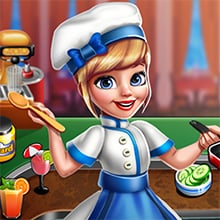
Restaurant Games
Discover 42 amazing restaurant games. Play for free and have fun!
About Restaurant Games
What Are Restaurant Games?
Restaurant games are a genre of video games that simulate the management and operation of a restaurant. These games often combine elements of time management, strategy, and simulation, providing players with the experience of running a virtual eatery.
The concept of restaurant games dates back to the early days of video gaming, when classics like Diner Dash and Burger Tycoon captivated gamers with their basic yet addicting gameplay. However, it was the introduction of mobile technology that actually drove this genre into the mainstream.
6 Features Of The Restaurant Games
6 standout features of the restaurant game genre include: Cooking and Preparing Meals, Restaurant Management, Time Management, Customer Service, Challenges, Customization and Upgrades.
-
Cooking And Preparing Meals: Players often take on the role of a chef, preparing various dishes according to recipes. This can involve chopping ingredients, cooking, assembling plates, and ensuring food is served hot and fresh.
-
Restaurant Management: This involves handling the day-to-day operations of the restaurant. The tasks that you need to handle are hiring staff, managing inventory, setting prices, and upgrading equipment and décor to attract more customers and improve service quality.
-
Time Management: Many restaurant games are fast-paced, requiring players to juggle multiple tasks simultaneously. Efficiently managing time and prioritizing tasks is key to help you succeed in these games.
-
Customer Service: Players must efficiently serve customers by taking orders, delivering food, and handling any complaints or special requests. The goal is to keep customers pleased so that you may earn tips and repeat business.
-
Challenges: Challenges can include handling a higher volume of customers, introducing new recipes, or dealing with unexpected events like equipment malfunctions. Players often progress through different levels or stages, each with increasing difficulty.
-
Customization and Upgrades: Players can frequently change their restaurant's design, menu, and layout. Earning money from effective operations enables you modifications that improve efficiency and customer happiness.
How Restauran Games Attract Too Many Players?
Restaurant games are popular because of their unique combination of elements that appeal to a wide range of interests and gaming styles. Here are 7 key reasons why players are drawn to these games:
Simulation of Real-Life Scenarios: Restaurant games offer a realistic but entertaining simulation of running a restaurant. Players enjoy the challenge of managing different aspects of the business, from cooking to customer service.
Time Management and Strategy: These games often require quick thinking and efficient multitasking. Players must prioritize tasks and manage their time effectively, which is both challenging and rewarding.
Progression and Achievement: Restaurant games provide a sense of progression, with growing complexity and new obstacles that keep players involved. Unlocking new recipes, updating equipment, and expanding the restaurant provide a sense of achievement.
Creativity and Customization: Many restaurant games allow players to customize their restaurant's appearance, menu, and layout. This creative freedom lets players personalize their gaming experience and express their unique style.
Educational Value: These games can help players learn the fundamentals of business management, such as budgeting, customer service, and problem resolution. Younger players, in particular, can improve their skills while having fun.
Social Interaction: Some restaurant games have social features, such as the opportunity to compete against friends or share achievements. This social feature can improve the gaming experience by providing an element of friendly competition or collaboration.
Appeal to Foodies: For those passionate about food and cooking, restaurant games provide a virtual playground to experiment with recipes and culinary techniques. The detailed and diverse menus in these games are particularly appealing to food enthusiasts.
Like Restaurant Games




































